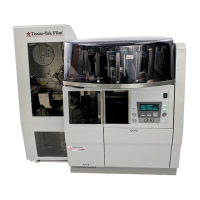INSTALLATION
2.10 Revised 08/08/2013
Preparation of Slides Prior to
Coverslipping
Only stains that can be coverslipped with a solvent-
based mounting medium should be used to stain slides
that will be coverslipped on the Tissue-Tek Film
Coverslipper. Stains that require the use of aqueous
mounting medium are not appropriate for use in
conjunction with this instrument.
Always use clean, reagent grade xylene in the final
steps of specimen staining. Small amounts of water left on
the slides may interfere with the adhesion of the
coverslipping film. For best results, be sure that the final
changes of xylene in the staining protocol are changed
frequently. If small bubbles are noticed in the xylene
containers or the xylene becomes cloudy or colored with
stain, the xylene should be changed.
Slides should be free of paraffin, foreign debris, and
staining residue.
This section states the importance of water and alcohol
removal from the slide. Dehydration in three (3) changes
of 100% alcohol for a minimum of 1 minute in each alcohol
is a recommended practice for proper dehydration.
Additionally, it is essential that the last 100% alcohol is
absolutely clear. Any evidence of pink in the last 100%
alcohol is evidence of the presence of water. Water is the
carrier of (the pink) Eosin. The rotation of these alcohols
may need to be increased to prevent the last alcohol from
becoming too diluted, just as is done in tissue processing.
It is important that no trace of alcohol remains on the
slide. Three (3) changes of Xylene for a minimum of 1
minute each is a recommended practice.
For best results, the time in the last reservoir of each
series of reagents should be extended to 2 or 3 minutes.
Note that the frequency of reagent rotation should be
periodically reviewed by the laboratory to cope with
increased slide workload.
Slides that are stained or prepared without xylene in
the final step (e.g., hematology smears) should be
immersed for several minutes prior to coverslipping to
remove any immersion oil or other residues.
The coverslipping film has a resin layer of finite
thickness. The available resin cannot accommodate wide
variations in specimen thickness. Bubbles may occur and
render specimens difficult to diagnose after storage.
NOTE: Cytology specimens (e.g., Pap smears, sputum
preparations, and bronchial lavages) may present
specimen thickness that may vary within wide extremes.
Inspect slides to reduce and/or limit thickness variations to
product quality Film Coverslipped slides.

